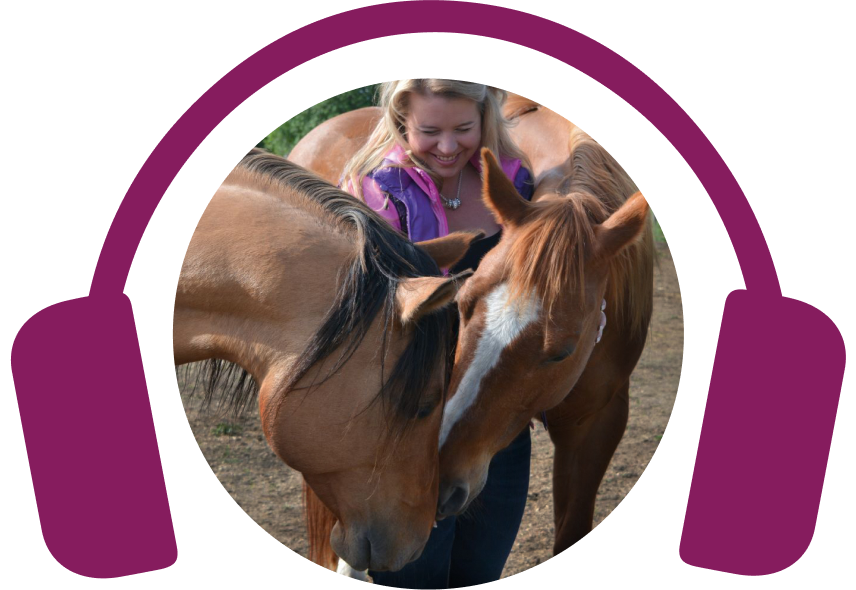Elisha’s Podcast
ELISHA’S PODCAST

Ready to get your horses on the path to better health?
This podcast was created to do just that.
Tune in to get new insights, perspectives, horse health tips, and real-life horse healing stories.
Take what you learn and apply it to your horse TODAY.

One Conversation at a time
From learning what to feed your horse and how to use nutrition effectively, to practicing prevention and approaching specific health challenges naturally, to just bringing your horse more joy and better health…
I’ve got you covered!

Check out my recent episodes
We are working hard, gearing up to launch my signature program, Healing Horses Their Way 2025. From late November to early December, we start rolling up our sleeves, setting the dates, mapping out the plan, and fine-tuning what will be in store for the coming year. Today, I take you behind the scenes to explain how we structure the program, what you will learn, the rollout date, and the benefits you stand to achieve. Join us this week to learn more about the signature program I proudly launched in 2018. Overview of the Program This signature program has been a favorite among horse owners and practitioners since it launched in 2018. It has been designed to give you a strong foundation in holistic horse care and is packed with practical, easy-to-understand information to help you make the best choices for a healthy and happy horse. Updated in 2020 with even more resources, it is a hands-on, flexible learning experience perfect for horse lovers at any level. A Supportive Global Community Caring for horses can feel like a solo adventure sometimes, especially if you live in a remote area. This course connects you with a worldwide community of like-minded people who share your passion. You will swap stories, share insights, and learn how horse care challenges are surprisingly universal, no matter where you are. How the Course Works The course spans 12 weeks and includes nine in-depth modules with a few pause weeks to allow you to work through the material at your own pace. Each module builds on the last, with practical exercises you can apply to any horse. A Holistic Mindset The course starts by helping you view horse health from a new perspective. You will learn to look at the history of a horse, spot patterns, and connect the dots between symptoms and underlying issues. It is a whole-horse approach that considers mental, physical, emotional, and even spiritual health, giving you a deep understanding of how the equine body works and reacts to care. Practical Horse Care In modules two and three, we dive into the fundamental aspects of anatomy, physiology, and diet. You will learn how to use food as medicine, tailoring the diet to address imbalances, intolerances, or allergies. By the end, you will know how to customize a feeding plan to meet the unique requirements of your horse. Advanced Tools for Health We also explore therapeutic nutrition, herbs, and homeopathy. You will learn to use vitamins, minerals, and natural remedies to tackle specific health challenges. These modules are all broken down into simple and easy-to-apply, actionable steps. Tackling Common Problems In the later modules, we get into the nitty-gritty of hoof health, toxins, and parasites. You will learn how to spot common hoof issues, like thrush or long toes, and how to address them naturally. You will also learn strategies to minimize exposure to toxins and manage parasites in ways that keep your horse feeling their best. Real-Life Solutions One of the highlights of this course is the final module, which has natural protocols for over 30 specific health issues. When you reach this point, you will have all the tools you need to create a personalized care program for your horse. You will also know how to track your horse's progress and adjust when necessary. Flexible and Easy to Follow The course is structured to fit into your busy life. The materials are released weekly, and there are live classes every Tuesday evening (with recordings if you cannot make it). There is also a private Facebook group where you can get extra support and connect with other participants, and quizzes you can complete along the way, and you will earn a certificate at the end. Ready to Join? Registration opens in mid-February, and the course kicks off on the 3rd of March. If you want to learn about holistic horse care and give your horse the gift of better health, this is the course for you! Join the waitlist on our website or email us at support@elishaedwards.comif you have any questions. Links and resources: Connect with Elisha Edwards on her website Join my email list to be notified about new podcast releases and upcoming webinars. Free Webinar Masterclass: Four Steps to Solving Equine Metabolic Syndrome Naturally Register for Resolving Equine Metabolic Syndrome Naturally, now. Today, we cover three foods to avoid for better horse health. This topic ties into our last discussion, where we explored toxicity in horses and how accumulated toxins can build up over time and lead to serious health issues. Sources of Toxicity in Horses Horses get exposed to various sources of toxicity, mainly through chemicals and preservatives in their food and water, medications, vaccinations, and deworming agents. Over time, the toxins build up and can overwhelm the immune system, leading to chronic health issues like inflammation, allergies, and sensitivities. Addressing the diet and removing toxic elements is often the first step toward recovery when horses are unwell. Corn Corn has high-calorie content and energy density, making it a common ingredient in horse feed. However, corn lowers digestive pH, leading to leaky gut and immune issues. It is also high in starch, which can overwhelm the small intestine if fed in excess, as the undigested starch can reach the hindgut, where it ferments, potentially causing acidosis, colic, or laminitis. Its low fiber content and imbalance of protein and amino acids make it less suitable as a standalone feed. There is also a risk of mold contamination when corn is improperly stored. While corn can be an energy boost for horses with high caloric needs, it is best to use it sparingly. Wheat Middlings Wheat middlings, a byproduct of milling wheat for flour, are often used as a source of fiber and protein in horse feed. They can be high in phosphorus and low in calcium, creating an imbalance that can affect bone health in horses if consumed in excess. Wheat middlings can also ferment in the hindgut, leading to digestive upsets like colic or laminitis. High levels of non-structural carbohydrates in wheat middlings can also be problematic for horses prone to metabolic issues like insulin resistance or equine metabolic syndrome. While middlings can be part of a balanced diet, feed them in moderation and combine them with other sources of fiber and essential nutrients. Processed Oils Canola, soybean, corn, or hydrogenated oils are not ideal for horses as they undergo high-temperature processing that generates free radicals, harming the immune system and leading to various diseases. Soybean oil can also create hormonal imbalances due to its phytoestrogen content. It is essential to choose cold-pressed, high-quality oils and only add them to the diet when necessary. High-Fat Diets High-fat diets can provide energy for horses doing heavy work or needing to gain weight, as fats are calorie-dense and provide slow-burning energy without the risks associated with high-starch feeds. However, horses lack a gallbladder and are biologically unsuited to process large quantities of oils. So, high-fat diets can cause digestive issues, malnutrition, and liver strain, slowing gut motility and worsening conditions like colic or ulcers. Balancing Nutrition While some challenging cases, like underweight or elderly horses, may require short-term use of problematic foods or oils, the goal should always be to provide high-quality, minimally processed nutrition in the long term. Horses thrive on a natural diet that aligns with their biology. For optimum health and resilience in your horse, pay attention to sensitivities and make adjustments where necessary. Final Thoughts Avoid ingredients like corn, wheat middlings, and processed oils. Focus on natural, high-quality feeds, and tailor the feeding strategy to fit the specific dietary requirements of your horse and support its long-term health and vitality. Links and resources: Connect with Elisha Edwards on her website Join my email list to be notified about new podcast releases and upcoming webinars. Free Webinar Masterclass: Four Steps to Solving Equine Metabolic Syndrome Naturally Register for Resolving Equine Metabolic Syndrome Naturally, now. We are focusing on toxicity today. Toxicity is one of the leading causes of equine disease. When the toxic load of horses exceeds what they can process, it becomes hard for their tissues to be healthy, their organs to function as they should, and their body systems to work together to sustain good health. Today, I scratch the surface of the vast and complex topic of toxicity, giving you a little food for thought. Since this is a massive subject, I will likely revisit it and dive deeper into some of the points we cover today in future episodes. Understanding Toxicity in Horses Toxicity refers to the degree to which a substance can harm cells, tissues, organs, or entire systems. For horses, toxicity often accumulates gradually, influencing their health over time. Genetic makeup, nutrition, and environmental exposure are all factors that determine how well a horse can handle toxins. Well-nourished horses with good constitutions and minimal exposure to harmful substances are generally more resilient. Yet they can also struggle as they age, particularly between 14 and 16 years, when signs of imbalance often emerge. Early Signs of Toxicity The initial effects of toxicity can be subtle and easy to overlook. A horse may develop a dull coat, cracked hooves, or irregular shedding patterns. Subtle changes like stiffness, swelling, joint discomfort, a weakened immune system, or slow recovery from illness could also indicate that the body struggles to handle its toxic load effectively. Key Sources of Toxicity Dietary imbalances Dietary imbalances are another major factor contributing to poor equine health. Excess sugar or protein can stress the body and lead to inflammation, metabolic issues, and poor gut health, and a diet heavy in oils can disrupt the gut microbiome. Acidity Acidity in the body often results from an imbalanced diet, leading to conditions like leaky gut, systemic inflammation, and joint issues. Hormonal imbalances, such as prolonged high cortisol or insulin levels, also cause significant damage over time, contributing to tissue breakdown, laminitis, and immune dysfunction. Antioxidants Antioxidants are crucial for combating free radicals, the unstable molecules that damage cells and DNA. Free radicals naturally occur during metabolic processes but increase with high toxic loads. Without sufficient antioxidants to neutralize them, free radicals can accelerate aging, weaken the immune system, and cause long-term damage. The Cumulative Effect of Toxicity Even though toxins seldom cause immediate harm, they accumulate over time. A horse that has consumed feed with additives, dealt with multiple infections, or been on long-term medications may eventually show signs of toxicity. The cumulative effect often leads to nutritional deficiencies, compromised immunity, and declining health. Strategies for Reducing Toxicity Final Thoughts Toxicity develops slowly. Understanding the sources and taking steps to minimize exposure will allow you to help your horse maintain vitality and resilience throughout its life. Proactive care and reducing toxic burdens will ensure their long-term health and well-being. Links and resources: Connect with Elisha Edwards on her website Join my email list to be notified about new podcast releases and upcoming webinars. Free Webinar Masterclass: Four Steps to Solving Equine Metabolic Syndrome Naturally Register for Resolving Equine Metabolic Syndrome Naturally, now.
Meet your host
Hi there, I’m Elisha Edwards

Meet your host
Hi there, I’m Elisha Edwards
I have helped guide thousands of horses back to good health over the years from a variety of different health challenges. And through my courses, webinars, and speaking engagements I educate and empower horse owner’s from around the world to take charge of their horse’s health using the holistic model of health care.
So I know first-hand how difficult and overwhelming it can be to navigate all the different opinions and conflicting information that you come across especially when your horse is faced with a health problem. In many cases, the journey is just as hard on the owners as it is on the horses.
I started Healing Horses with Elisha to guide you, support you, and encourage you through the process of prevention and recovery so you feel good about the decisions you’re making for them.
Here’s what I believe
I have seen countless horses with seemingly impossible health conditions that have been resolved so easily with the right combination of diet, nutrition, and natural remedies. In many cases, it is not the health conditions that prevents the horse from recovering, it is the lack of education, resources, and options that are available.
If the insight and information you gain from this podcast gives you some newfound hope or inspires you to take
a new approach then it has served it’s purpose.
Thank you for giving me the opportunity to help you improve your horse’s health.
Keep listening and learning. Your horse is worth it.
Listen Now
Tune in wherever you listen to your podcasts and follow me so you never miss an episode. I release a new one every Tuesday!

Leave a Review
Reviews help me reach more horses and also help me deliver more relevant content to you!

What my Listeners are saying
“Every time I think there is no way to top what you do – you elevate us to yet another level. I wish I had a fraction of your communication skills. You’re amazing and I am so grateful to be apart of the magic you are creating for horses and their humans.”
Tracey
“Your podcasts are fantastic! I get so excited to listen to the next one. I have 6 geriatric horses and your podcast has really opened my mind to new possibilities in their health and given me the strength to help them through hiccups in their well-being the past few months. I have a nursing education and you explain pathology better than my university professors.”
Sharon
“I can’t thank you enough for the Mindset Tips podcast. I really needed this reminder. It was just what I needed to hear to today.”



